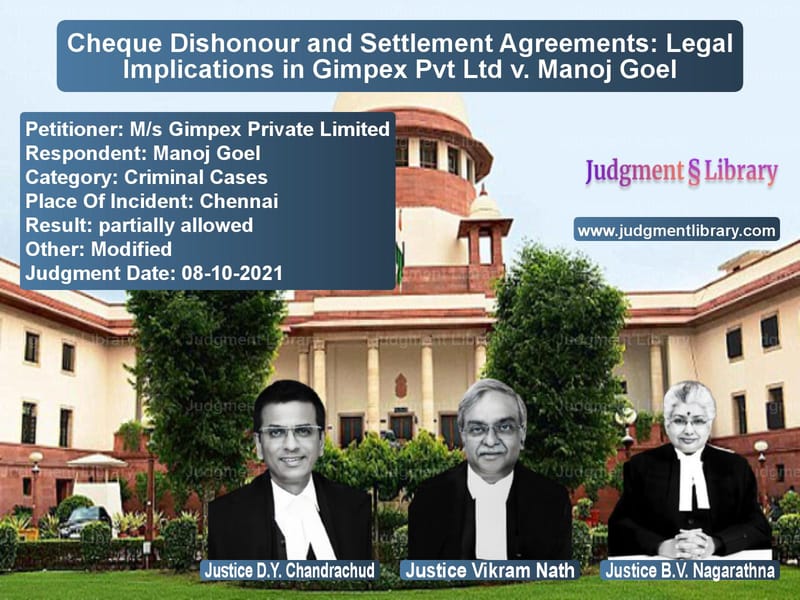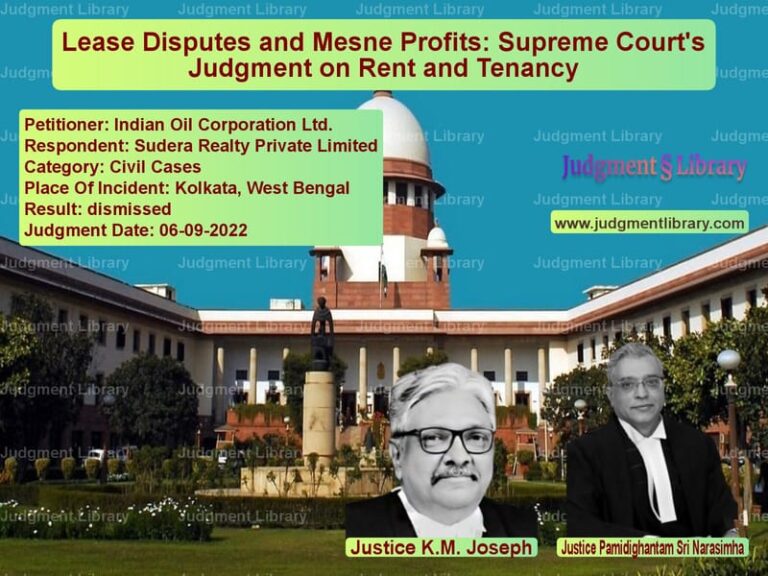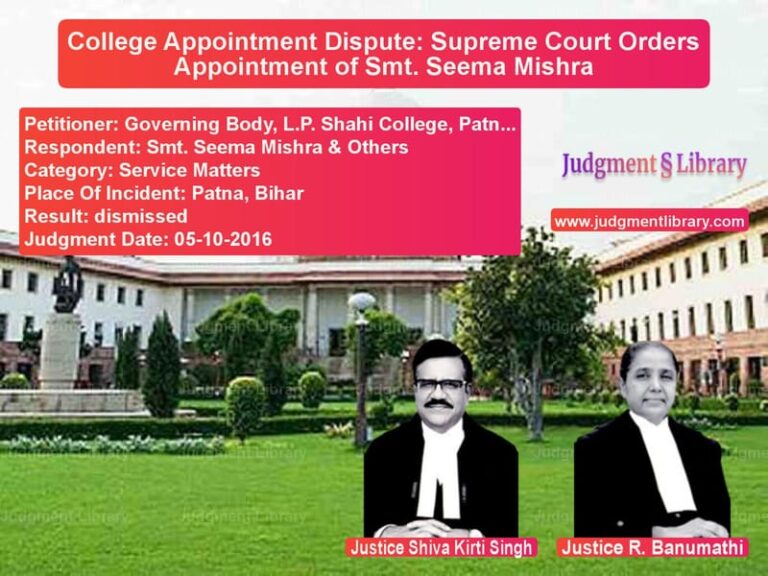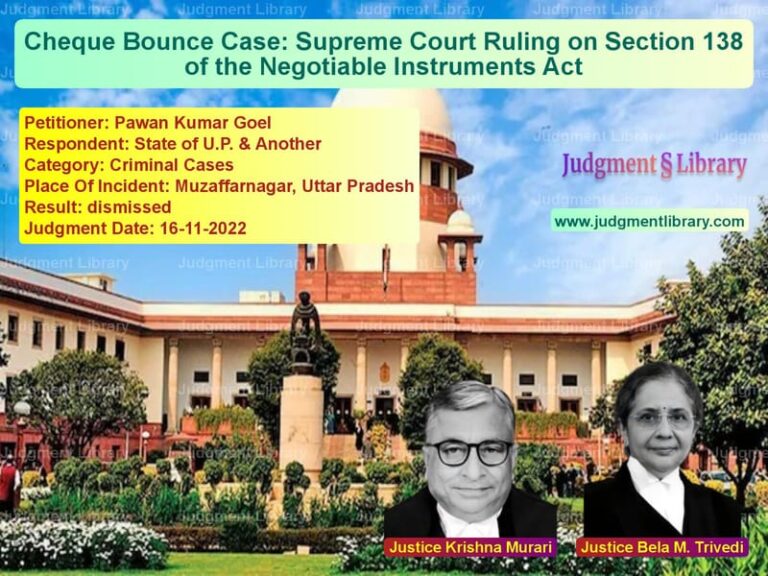Cheque Dishonour and Settlement Agreements: Legal Implications in Gimpex Pvt Ltd v. Manoj Goel
The case of M/s Gimpex Private Limited vs. Manoj Goel arose out of a dispute concerning dishonoured cheques and the subsequent implications of a settlement agreement. The Supreme Court of India, in its judgment dated October 8, 2021, examined the legality of pursuing parallel prosecutions under Section 138 of the Negotiable Instruments Act, 1881 (NI Act) when a settlement agreement had been reached. The Court also deliberated on the obligations arising from such an agreement and the validity of prosecuting cheques issued pursuant to it.
Background of the Case
The case stemmed from a business transaction involving M/s Gimpex Private Limited (the appellant) and Aanchal Cement Limited (ACL). The appellant had entered into a High Seas Sale Agreement with ACL and made payments on behalf of ACL, expecting reimbursement. ACL, however, failed to make the due payments and instead issued 18 cheques of Rs. 50 lakhs each, totaling Rs. 9 crores, as partial payment.
When these cheques were presented for payment, they were dishonoured with the notations ‘payment stopped by drawer’ and ‘insufficient funds’. This led to the filing of a complaint under Section 138 of the NI Act against ACL and its directors, including the respondent, Manoj Goel.
Read also: https://judgmentlibrary.com/supreme-court-cancels-anticipatory-bail-in-madhya-pradesh-murder-case/
Settlement Agreement and Second Set of Cheques
During the legal proceedings, ACL approached Gimpex Private Limited for a settlement. A compromise agreement was entered into on March 12, 2013, under which:
- ACL agreed to pay Rs. 3 crores immediately via a demand draft.
- The remaining Rs. 7 crores would be paid in three equal monthly installments.
- New post-dated cheques were issued for the installments.
- Gimpex Private Limited agreed to withdraw its objections to the bail applications of ACL’s directors.
Despite the agreement, the second set of cheques was also dishonoured, prompting Gimpex Private Limited to file a second complaint under Section 138 of the NI Act. This led to parallel prosecutions—one for the original dishonoured cheques and another for the dishonoured cheques issued under the settlement agreement.
Arguments Presented
Petitioner’s Arguments
Represented by senior counsel Mr. V Giri, the petitioner argued:
- The offence under Section 138 was complete as soon as a cheque was dishonoured, and the complaint should proceed to trial.
- The settlement agreement did not nullify the liability under the original cheques.
- Parallel prosecutions were legally permissible.
- Section 139 of the NI Act created a presumption that the second set of cheques were issued to discharge a legally enforceable debt.
Respondent’s Arguments
Represented by Mr. Jayant Bhushan, the respondent argued:
- The liability under the first set of cheques had been replaced by the settlement agreement and the second set of cheques.
- Once a settlement was reached, the original liability ceased to exist.
- Pursuing two prosecutions for the same liability was unlawful.
- The appellant had repudiated the settlement by not withdrawing the earlier complaint.
Supreme Court’s Analysis
Parallel Prosecutions
The Court examined whether both complaints could proceed simultaneously. It ruled that once a settlement agreement had been entered into, the original complaint should be quashed, as the parties had voluntarily altered the nature of their obligations. The Court emphasized that allowing both complaints to proceed would:
- Lead to contradictory outcomes.
- Undermine the purpose of settlements.
- Overburden the judicial system.
- Discourage amicable dispute resolution.
Validity of Second Complaint
The Court also examined whether the dishonoured cheques issued under the settlement agreement gave rise to a new offence under Section 138. It ruled that:
- The settlement agreement created a fresh legal obligation.
- The presumption under Section 139 applied to the second set of cheques.
- The liability arising from the compromise agreement was distinct from the original debt.
Thus, the Court held that the second complaint should proceed, while the first complaint should be quashed.
Key Judicial Observations
The Court made several key observations:
“Once a settlement agreement has been entered into by the parties, the proceedings in the original complaint cannot be sustained and a fresh cause of action accrues to the complainant under the terms of the settlement deed.”
“A contrary interpretation, which allows for the complainant to pursue both the original complaint and the consequences arising out of the settlement, would lead to contradictory results.”
“The presumption under Section 139 of the NI Act applies, and the accused must provide evidence at trial to rebut it.”
Final Judgment
The Supreme Court issued the following directives:
- The first complaint based on the original set of cheques was quashed.
- The second complaint based on the dishonoured cheques issued under the settlement agreement was reinstated.
- The respondent’s plea to quash the second complaint was dismissed.
- The matter was directed to proceed to trial on the merits of the second complaint.
Significance of the Judgment
This judgment sets a crucial precedent in cases involving multiple dishonoured cheques and settlement agreements:
- It clarifies that once a settlement is reached, the original complaint loses its validity.
- It upholds the principle that new cheques issued as part of a settlement create a separate legal liability.
- It reinforces the importance of Section 139’s presumption in favour of the complainant.
- It discourages vexatious litigation by preventing multiple prosecutions for the same debt.
Ultimately, the Supreme Court’s ruling balances the rights of both parties while ensuring judicial efficiency and the enforceability of negotiated settlements.
Petitioner Name: M/s Gimpex Private Limited.Respondent Name: Manoj Goel.Judgment By: Justice D.Y. Chandrachud, Justice Vikram Nath, Justice B.V. Nagarathna.Place Of Incident: Chennai.Judgment Date: 08-10-2021.
Don’t miss out on the full details! Download the complete judgment in PDF format below and gain valuable insights instantly!
Download Judgment: ms-gimpex-private-l-vs-manoj-goel-supreme-court-of-india-judgment-dated-08-10-2021.pdf
Directly Download Judgment: Directly download this Judgment
See all petitions in Fraud and Forgery
See all petitions in Cheque Dishonour Cases
See all petitions in Judgment by Dhananjaya Y Chandrachud
See all petitions in Judgment by Vikram Nath
See all petitions in Judgment by B.V. Nagarathna
See all petitions in partially allowed
See all petitions in Modified
See all petitions in supreme court of India judgments October 2021
See all petitions in 2021 judgments
See all posts in Criminal Cases Category
See all allowed petitions in Criminal Cases Category
See all Dismissed petitions in Criminal Cases Category
See all partially allowed petitions in Criminal Cases Category







